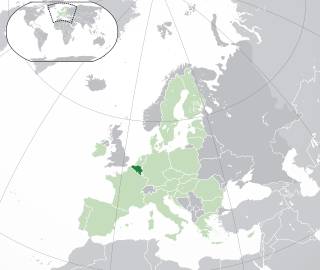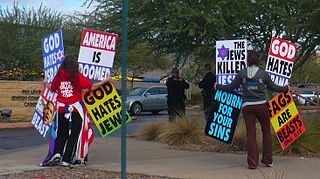Antisemitism is hostility to, prejudice towards, or discrimination against Jews. A person who holds such positions is called an antisemite. Antisemitism is considered to be a form of racism.
Antisemitism in Islam refers to the Islamic scriptural and theological teachings against Jews and Judaism, and the treatment and persecution of Jews in the Muslim world.

The history of Jews in Sweden can be traced from the 17th century, when their presence is verified in the baptism records of the Stockholm Cathedral. Several Jewish families were baptised into the Lutheran Church, a requirement for permission to settle in Sweden. In 1681, for example, 28 members of the families of Israel Mandel and Moses Jacob were baptised in the Stockholm German Church in the presence of King Charles XI of Sweden, the dowager queen Hedvig Eleonora of Holstein-Gottorp, and several other high state officials.

The history of the Jews in Belgium goes back to the 1st century CE until today. The Jewish community numbered 66,000 on the eve of the Second World War but, after the war and The Holocaust, is now less than half that number.

There have been different opinions among historians with regard to the extent of antisemitism in America's past and how American antisemitism contrasted with its European counterpart. Earlier students of American Jewish life minimized the presence of antisemitism in the United States, which they considered a late and alien phenomenon that arose on the American scene in the late 19th century. More recently however, scholars have asserted that no period in American Jewish history was free of antisemitism. The debate about the significance of antisemitism during different periods of American history has continued to the present day.
Antisemitism in contemporary Norway deals with antisemitic incidents and attitudes encountered by Jews, either individually or collectively, in Norway since World War II. The mainstream Norwegian political environment has strongly adopted a platform that rejects antisemitism. However, individuals may privately hold antisemitic views. Currently, there are about 1,400 Jews in Norway, in a population of 5.3 million.
Antisemitism —prejudice, hatred of, or discrimination against Jews has experienced a long history of expression since the days of ancient civilizations, with most of it having originated in the Christian and pre-Christian civilizations of Europe.

Antisemitism in the United States has existed for centuries. In the United States, most Jewish community relations agencies draw distinctions between antisemitism, which is measured in terms of attitudes and behaviors, and the security and status of American Jews, which are both measured by the occurrence of specific incidents. FBI data shows that in every year since 1991, Jews were the most frequent victims of religiously motivated hate crimes, according to a report which was published by the Anti-Defamation League in 2019. Evidence suggests that the true number of hate crimes against Jews is underreported, as is the case for many other targeted groups.
Antisemitic incidents escalated worldwide in frequency and intensity during the Gaza War, and were widely considered to be a wave of reprisal attacks in response to the conflict.
Antisemitism in Canada is the manifestation of hostility, prejudice or discrimination against the Canadian Jewish people or Judaism as a religious, ethnic or racial group. This form of racism has affected Jews since Canada's Jewish community was established in the 18th century.
Antisemitism in Turkey refers to acts of hostility against Jews in the Republic of Turkey, as well as the promotion of antisemitic views and beliefs in that country.
The Jewish community in Sweden has been prevalent since the 18th century. Today Sweden has a Jewish community of around 20,000, which makes it the 7th largest in the European Union.
Antisemitism in Pakistan is the presence of hostility and discrimination against Jews in Pakistan based on prejudices against the Jewish people and/or the religion of Judaism. Alongside the prevalence of general stereotypes, Jews are commonly subjected to negative views, feelings and rhetoric in Pakistan, most of which overlap with and are directly related to the antisemitic views prevalent throughout the Islamic world. Widely regarded as miserly within Pakistani Muslim circles, Jews residing in Pakistan have also faced periodic intolerance by the state, which has intensified since the Islamization period of the 1980s under Muhammad Zia-ul-Haq, who propelled Pakistan towards the adoption of strict and highly-conservative Islamic practices and laws. The Jewish population of Pakistan has rapidly decreased since the state's founding and separation from neighbouring India in August 1947, and as of 2019 estimates, stands at less than 200 people amidst Pakistan's total population of over 200 million, the majority of whom are Muslims.
Antisemitism in France has become heightened since the late 20th century and into the 21st century. In the early 21st century, most Jews in France, like most Muslims in France, are of North African origin. France has the largest population of Jews in the diaspora after the United States—an estimated 500,000–600,000 persons. Paris has the highest population, followed by Marseilles, which has 70,000 Jews, most of North African origin. Expressions of anti-semitism were seen to rise during the Six-Day War of 1967 and the French anti-Zionist campaign of the 1970s and 1980s. Following the electoral successes achieved by the extreme right-wing National Front and an increasing denial of the Holocaust among some persons in the 1990s, surveys showed an increase in stereotypical antisemitic beliefs among the general French population.
Since World War II, antisemitic prejudice in Italy has seldom taken on aggressive forms.
Antisemitism in the United Kingdom signifies hatred of and discrimination against Jews in Britain. Discrimination and hostility against the community since its establishment in 1070 resulted in a series of massacres on several occasions and their expulsion from the country in 1290. They were readmitted by Oliver Cromwell in 1655.
Evidence for the presence of Jewish communities in the geographical area today covered by Austria can be traced back to the 12th century. In 1848 Jews were granted civil rights and the right to establish an autonomous religious community, but full citizenship rights were given only in 1867. In an atmosphere of economic, religious and social freedom, the Jewish population grew from 6,000 in 1860 to almost 185,000 in 1938. In March 1938, Austria was annexed by Nazi Germany and thousands of Austrians and Austrian Jews who opposed Nazi rule were sent to concentration camps. Of the 65,000 Viennese Jews deported to concentration camps, only about 2,000 survived, while around 800 survived World War II in hiding.
Belgium is a European country with a Jewish population of approximately 35,000 out of a total population of about 11.4 million. It is among the countries experiencing an increase in both antisemitic attitudes and in physical attacks on Jews.
This timeline of antisemitism chronicles the facts of antisemitism, hostile actions or discrimination against Jews as a religious or ethnic group, in the 21st century. It includes events in the history of antisemitic thought, actions taken to combat or relieve the effects of antisemitism, and events that affected the prevalence of antisemitism in later years. The history of antisemitism can be traced from ancient times to the present day.

The Halle synagogue shooting occurred on 9 October 2019 in Halle, Saxony-Anhalt, Germany, and continued in nearby Landsberg. After unsuccessfully trying to enter the synagogue in Halle during the Jewish holiday of Yom Kippur, the attacker, later identified as 27-year-old Stephan Balliet, fatally shot two people nearby and later injured two others.





